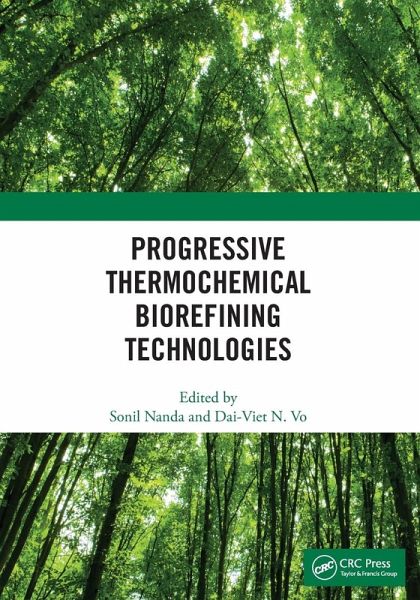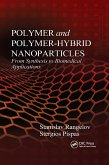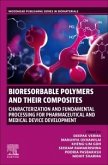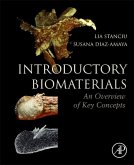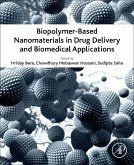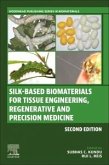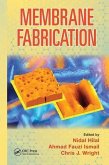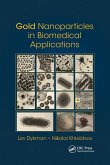Progressive Thermochemical Biorefining Technologies
Herausgeber: Nanda, Sonil; N Vo, Dai-Viet
Progressive Thermochemical Biorefining Technologies
Herausgeber: Nanda, Sonil; N Vo, Dai-Viet
- Broschiertes Buch
- Merkliste
- Auf die Merkliste
- Bewerten Bewerten
- Teilen
- Produkt teilen
- Produkterinnerung
- Produkterinnerung
The global interest in biorefining technologies, especially thermochemical and biological conversion processes are gaining momentum in academic and industrial perspectives.
Andere Kunden interessierten sich auch für
![Polymer and Polymer-Hybrid Nanoparticles Polymer and Polymer-Hybrid Nanoparticles]() Stanislav RangelovPolymer and Polymer-Hybrid Nanoparticles94,99 €
Stanislav RangelovPolymer and Polymer-Hybrid Nanoparticles94,99 €![Bioresorbable Polymers and Their Composites Bioresorbable Polymers and Their Composites]() Bioresorbable Polymers and Their Composites310,99 €
Bioresorbable Polymers and Their Composites310,99 €![Introductory Biomaterials Introductory Biomaterials]() Lia StanciuIntroductory Biomaterials120,99 €
Lia StanciuIntroductory Biomaterials120,99 €![Biopolymer-Based Nanomaterials in Drug Delivery and Biomedical Applications Biopolymer-Based Nanomaterials in Drug Delivery and Biomedical Applications]() Biopolymer-Based Nanomaterials in Drug Delivery and Biomedical Applications218,99 €
Biopolymer-Based Nanomaterials in Drug Delivery and Biomedical Applications218,99 €![Silk-Based Biomaterials for Tissue Engineering, Regenerative and Precision Medicine Silk-Based Biomaterials for Tissue Engineering, Regenerative and Precision Medicine]() Silk-Based Biomaterials for Tissue Engineering, Regenerative and Precision Medicine332,99 €
Silk-Based Biomaterials for Tissue Engineering, Regenerative and Precision Medicine332,99 €![Membrane Fabrication Membrane Fabrication]() Membrane Fabrication130,99 €
Membrane Fabrication130,99 €![Gold Nanoparticles in Biomedical Applications Gold Nanoparticles in Biomedical Applications]() Lev DykmanGold Nanoparticles in Biomedical Applications103,99 €
Lev DykmanGold Nanoparticles in Biomedical Applications103,99 €-
-
-
The global interest in biorefining technologies, especially thermochemical and biological conversion processes are gaining momentum in academic and industrial perspectives.
Hinweis: Dieser Artikel kann nur an eine deutsche Lieferadresse ausgeliefert werden.
Hinweis: Dieser Artikel kann nur an eine deutsche Lieferadresse ausgeliefert werden.
Produktdetails
- Produktdetails
- Verlag: Taylor & Francis Ltd (Sales)
- Seitenzahl: 204
- Erscheinungstermin: 8. Oktober 2024
- Englisch
- Abmessung: 254mm x 178mm x 12mm
- Gewicht: 386g
- ISBN-13: 9780367566104
- ISBN-10: 0367566109
- Artikelnr.: 71562266
- Herstellerkennzeichnung
- Produktsicherheitsverantwortliche/r
- Europaallee 1
- 36244 Bad Hersfeld
- gpsr@libri.de
- Verlag: Taylor & Francis Ltd (Sales)
- Seitenzahl: 204
- Erscheinungstermin: 8. Oktober 2024
- Englisch
- Abmessung: 254mm x 178mm x 12mm
- Gewicht: 386g
- ISBN-13: 9780367566104
- ISBN-10: 0367566109
- Artikelnr.: 71562266
- Herstellerkennzeichnung
- Produktsicherheitsverantwortliche/r
- Europaallee 1
- 36244 Bad Hersfeld
- gpsr@libri.de
Dr. Sonil Nanda is a Research Associate at the University of Saskatchewan in Saskatoon, Saskatchewan, Canada. He received his Ph.D. degree in Biology from York University, Canada; M.Sc. degree in Applied Microbiology from Vellore Institute of Technology (VIT University), India; and B.Sc. degree in Microbiology from Orissa University of Agriculture and Technology, India. Dr. Nanda's research areas are related to the production of advanced biofuels and biochemical through thermochemical and biochemical conversion technologies such as gasification, pyrolysis, carbonization, torrefaction, and fermentation. He has gained expertise in hydrothermal gasification of various organic wastes and biomass including agricultural and forestry residues, industrial effluents, municipal solid wastes, cattle manure, sewage sludge, food wastes, waste tires, and petroleum residues to produce hydrogen fuel. His parallel interests are also in the generation of hydrothermal flames for the treatment of hazardous wastes, agronomic applications of biochar, phytoremediation of heavy metal contaminated soils, as well as carbon capture and sequestration. Dr. Nanda has published 14 books, 50 book chapters and over 100 peer-reviewed journal articles. He is the editor of books entitled "New Dimensions in Production and Utilization of Hydrogen" (Elsevier), "Recent Advancements in Biofuels and Bioenergy Utilization" (Springer Nature), "Biorefinery of Alternative Resources: Targeting Green Fuels and Platform Chemicals" (Springer Nature), "Fuel Processing and Energy Utilization" (CRC Press), "Bioprocessing of Biofuels" (CRC Press) and "Biotechnology for Sustainable Energy and Products" (I.K. International Publishing House Pvt. Ltd.). Dr. Nanda serves as a Fellow Member of the Society for Applied Biotechnology in India, as well as a Life Member of the Indian Institute of Chemical Engineers, Association of Microbiologists of India, Indian Science Congress Association, and the Biotech Research Society of India. He is also an active member of several chemical engineering societies across North America such as the American Institute of Chemical Engineers, the Chemical Institute of Canada, the Combustion Institute-Canadian Section, and Engineers Without Borders Canada. Dr. Nanda is an Assistant Subject Editor of the International Journal of Hydrogen Energy (Elsevier) as well as an Associate Editor of Environmental Chemistry Letters (Springer Nature) and Applied Nanoscience (Springer Nature). He has also edited several special issues in renowned journals such as the International Journal of Hydrogen Energy (Elsevier), Chemical Engineering Science (Elsevier), Biomass Conversion and Biorefinery (Springer Nature), Waste and Biomass Valorization (Springer Nature), Topics in Catalysis (Springer Nature), SN Applied Sciences (Springer Nature), and Chemical Engineering & Technology (Wiley). Dr. Dai-Viet N. Vo is currently the Director of the Center of Excellence for Green Energy and Environmental Nanomaterials at Nguyen Tat Thanh University in Ho Chi Minh City, Vietnam. He received his Ph.D. degree in Chemical Engineering from The University of New South Wales in Sydney, Australia in 2011. He has worked as a postdoctoral fellow at the University of New South Wales in Sydney and Texas A&M University in Qatar, Doha. Formerly, he was a Senior Lecturer at the Faculty of Chemical & Natural Resources Engineering in the Universiti Malaysia Pahang in Kuantan, Malaysia (2013-2019). His research areas are in the production of green synthetic fuels via Fischer-Tropsch synthesis using biomass-derived syngas from various reforming processes. He is also an expert in advanced material synthesis and catalyst characterization. During his early career, he has worked as the principal investigator and co-investigator for 21 different funded research projects related to sustainable and alternative energy. He has published 5 books, 16 book chapters, more than 300 peer-reviewed journal articles and conference proceedings. He has served in the technical and publication committees of numerous international conferences in chemical engineering, catalysis and renewable energy. Dr. Vo is the editor of books entitled "New Dimensions in Production and Utilization of Hydrogen " (Elsevier), "Biorefinery of Alternative Resources: Targeting Green Fuels and Platform Chemicals" (Springer Nature) and "Fuel Processing and Energy Utilization" (CRC Press). Dr. Vo is an Assistant Subject Editor for the International Journal of Hydrogen Energy (Elsevier) and a Guest Editor for several Special Issues in high-impact factor journals such as the International Journal of Hydrogen Energy (Elsevier), Comptes Rendus Chimie (Elsevier), Waste and Biomass Valorization (Springer), Topics in Catalysis (Springer), Journal of Chemical Technology & Biotechnology (Wiley), Chemical Engineering & Technology (Wiley) and several others. He is the Assistant Subject Editor of the International Journal of Hydrogen Energy (Elsevier) and Associate Editor of Environmental Chemistry Letters (Springer Nature) and Applied Nanoscience (Springer Nature). He is also an Editorial Board Member of many international journals including SN Applied Sciences (Springer), Scientific Reports (Springer Nature) and PLOS One. Dr. Vo has been awarded as a Top Peer Reviewer 2019 powered by Publons.
Thermochemical and biological conversion of biomass into biofuels and
biochemicals. Solid and liquid biofuels from waste and biomass: Production,
characterization and combustion. Conversion of municipal solid waste to
biofuels. Conversion of plastic waste to fuels and chemicals. Torrefied
solids: A material border lining biomass and biochar. Pelletization of
torrefied biomass using binders. Lignocellulosic biomass conversion to
syngas through co-gasification approach. Glycerol: A promising green source
for chemicals and fuels. Effect of substrates on the performance of
microbial fuel cell for sustainable energy production. Oil price shocks,
environmental pollution, foreign direct investment and renewable energy
consumption: An empirical analysis in East Asian countries.
biochemicals. Solid and liquid biofuels from waste and biomass: Production,
characterization and combustion. Conversion of municipal solid waste to
biofuels. Conversion of plastic waste to fuels and chemicals. Torrefied
solids: A material border lining biomass and biochar. Pelletization of
torrefied biomass using binders. Lignocellulosic biomass conversion to
syngas through co-gasification approach. Glycerol: A promising green source
for chemicals and fuels. Effect of substrates on the performance of
microbial fuel cell for sustainable energy production. Oil price shocks,
environmental pollution, foreign direct investment and renewable energy
consumption: An empirical analysis in East Asian countries.
Thermochemical and biological conversion of biomass into biofuels and
biochemicals. Solid and liquid biofuels from waste and biomass: Production,
characterization and combustion. Conversion of municipal solid waste to
biofuels. Conversion of plastic waste to fuels and chemicals. Torrefied
solids: A material border lining biomass and biochar. Pelletization of
torrefied biomass using binders. Lignocellulosic biomass conversion to
syngas through co-gasification approach. Glycerol: A promising green source
for chemicals and fuels. Effect of substrates on the performance of
microbial fuel cell for sustainable energy production. Oil price shocks,
environmental pollution, foreign direct investment and renewable energy
consumption: An empirical analysis in East Asian countries.
biochemicals. Solid and liquid biofuels from waste and biomass: Production,
characterization and combustion. Conversion of municipal solid waste to
biofuels. Conversion of plastic waste to fuels and chemicals. Torrefied
solids: A material border lining biomass and biochar. Pelletization of
torrefied biomass using binders. Lignocellulosic biomass conversion to
syngas through co-gasification approach. Glycerol: A promising green source
for chemicals and fuels. Effect of substrates on the performance of
microbial fuel cell for sustainable energy production. Oil price shocks,
environmental pollution, foreign direct investment and renewable energy
consumption: An empirical analysis in East Asian countries.

